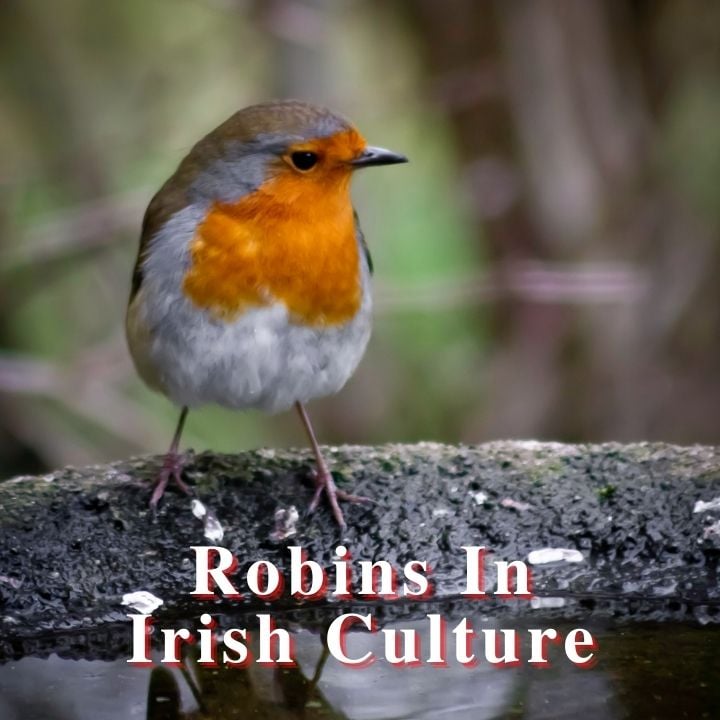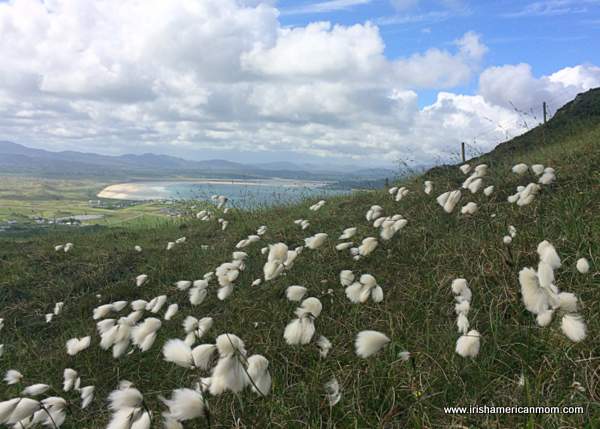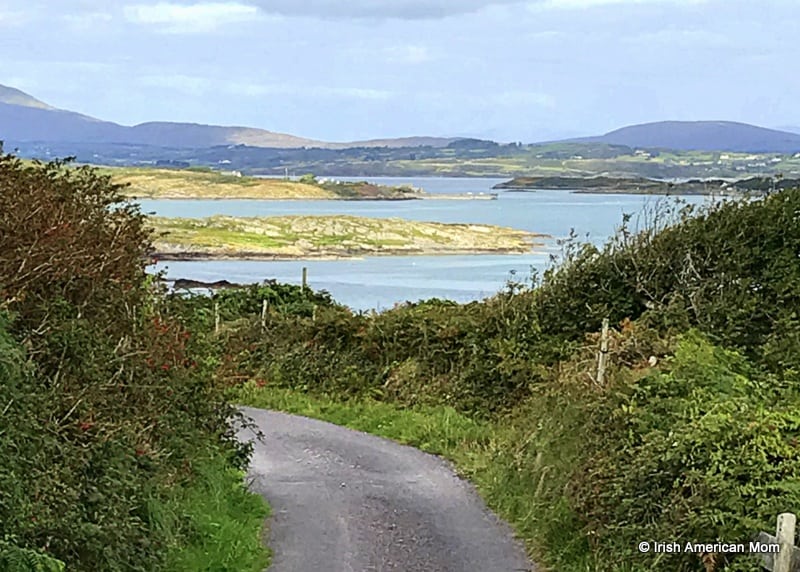Robins remind me of Ireland. These little red breasted warblers are found throughout Ireland, even in cities and towns.
Robins love to sing and in Ireland they sing all year round, even in the winter.
If I was to name my favorite bird, it probably would be a robin.

Table of Contents
Irish Robins
I remember gardening with my mother as a child, and being amazed by how tame robins appeared. They often followed us around the garden, pecking for worms and insects in the grass as we worked.
Irish robins are much smaller than the American variety. I remember seeing an American robin for the first time and being amazed at how big it was. I suppose everything is bigger over here.
Today's post focuses on little Irish robins. Thanks to a good friend Anthony in Donegal, for sending me these amazing photos of my favorite little songbird.
Irish robins feast on worms, spiders and insects during the spring, summer and early autumn. But in winter they feast on berries, like haws and holly berries.

God's Own Bird
As children we learned the robin is God's own bird, sacred and revered in legend and folklore.
We were enthralled by the story of how a little robin tried to remove one of the bloody thorns piercing Christ's head at the time of the Crucifixion.
A drop of the Lord's blood fell on the little brown bird, staining its chest red and that is how the robin became the robin red breast.
Then there are the lines from William Blake:
"A Robin Redbreast in a Cage
Puts all Heaven in a Rage."
~ From "Auguries of Innocence by William Blake

Irish Superstitions About Robins
There are many Irish superstitions surrounding robins and they feature in Irish folklore.
Above all is the warning never to take the life of this red-breasted songster. It is believed that anyone who kills a robin will have a life full of misery, clearly expressed in these old words of caution:
"Whoever kills a robin redbreast will never have good luck,
Even if they lived to be a thousand years old. "
Another old Irish lesson about kindness to robins tells that if anyone kills a robin a large growth will grow on the assailant's hand, preventing the killer from working or playing hurling (an ancient Irish team sport played with sticks and a ball).
Celtic Tales of Wrens and Robins
There is an old Celtic tale that tells of the rivalry between the wren and the robin. An eternal feud simmers between the Holly King of Winter (a wren) and the Oak King of Summer (a robin).
On the Winter Solstice the robin or Oak King drives the Holly King or wren away.
The reverse happens at the summer solstice when when the Holly King defeats the Oak King.
The two kings or birds are said to engage in a battle with no end. This represents the wheel of life and the seasonal cycles. We transition from the light half to the dark half ot the year at the solstices.

Robins Predict The Weather
The robin is supposedly blessed with amazing powers for predicting the weather.
The little bird may even be more accurate than Ireland's rain weary meteorologists with their never ending warnings of scattered showers.
- Long and loud singing of the robin in the morning, is a sure sign of rain.
- A robin sheltering in the dense branches of a tree is another indicator of rain.
- If one is seen chirping on an open tree branch, then fine weather is practically guaranteed.

Why are robins associated with Christmas Time
Robins are associated with Christmas time, first appearing in the 19th century on traditional Victorian cards. Ever since their red foliage has been linked with the holiday.
The tradition of sending Christmas cards started in Victorian Times. Postmen or mail men at that time wore bright red uniforms. They were nicknamed mail robins or redbreasts. Because they delivered Christmas cards, the robin therefore became associated with these festive greetings and pictures of the little red breasted birds started appearing on card.
Other robin themed Christmas items soon followed suit and the little bird became associated with the holiday.
A Territorial Little Bird
This favorable and popular view of the robin in Ireland is not supported by its disposition.
They are fiercely territorial and love a good old brawl. Maybe that's why we Irish like them so much. This affinity for a good fight is not uncommon in birds.
What makes robins different is that they fight fiercely, often to the bitter end. They're not quitters and therefore worthy of our admiration.
Both males and females retain their own territories during the winter months. Males are more aggressive than females and will puff out their red breasts as a warning. A male will warble at a high pitched rate to fend off any intruders to its territory or any contenders for its mate.
The robin sings all year round, and in Ireland is the only bird that will sing all through the winter.
They build their nest in well concealed places such as hollowed out spaces in trees, in the middle of ivy or a nook in a garden shed. In spring the female lays about six eggs in the nest.

Robins Foretell Death
Robins are also said to be able to predict death. A robin flying into a home through an open window is an ominous sign.
My granny always told us how a robin flew into her kitchen on the day she lost her three year-old son, my uncle Danny.
From the time of his birth in the early 1930's he suffered from hydrocephalus and "a lump on his neck". Today we know his diagnosis was probably spina bifida.
Yet Granny never feared robins nor blamed the little bird for being a messenger of doom.
She believed the robin was sent from God to help prepare and console her at the time of her great loss. She taught us to love robins too.

Wishing on the First Robin of Spring
Time for one last piece of advice. If you see the first robin of spring, make a wish. But do so quickly.
This old wives' tale warns that if the bird flies away before you have made your wish, you have an unlucky year ahead of you.
And so I hope these photos of Ireland's most common and best loved songbird brings you a little smile today. Here's to all the wishes waiting to be granted by those first robins of spring.
Thanks for following my recipes and ramblings.

Slán agus beannacht,
(Goodbye and blessings)
Mairéad -Irish American Mom
Pronunciation - slawn ah-gus ban-ock-th
Mairéad - rhymes with parade
Here are some more recipes and ramblings you might enjoy...
Irish Traditions
- Explore The Origins Of The Celtic Festival Of Imbolc
- The Pilgrim Path or Tóchar Phádraig
- Igniting Tradition - The Blaze of Halloween Bonfires
- How The Irish Celebrate Saint Paddy's Day
Christmas
- Sewing Spool Christmas Tree Ornament Craft
- Tissue Paper Christmas Tree Cone Craft
- Cardboard Tube Paper Plate Christmas Wreath
- Stirrings by Máire Malone - An Irish Poem for Christmas

















Penny Wolf
I really loved this post. What beautiful little birds and equally beautiful respect that surrounds them. Birds in general are special with their feathers of colors and a song for anyone who can hear. Not to mention watching them fly and dreaming about what that must be like.
(Top honors to the chicken for the most obvious gift of all.The world owes the chicken if you ask me)
Our family always said any bird into the house was a death sign.It does not count however if it leaves on it's own or if the cat brought it in. Now I wonder if our belief stems from your little bird....
I enjoy coming here to your site,thanks again.
Irish American Mom
Thanks so much for stopping by. I think you might be right about your family's superstitions being linked to their Irish ancestry. I love hearing about all these old tales. Take care,
Mairead
Penny Wolf
Here was another interesting saying that my family has repeated but had no idea why we say it.
"Blessed be the corpse that gets rained on". My 100 year old Great Uncle passed away last year and was buried on a rainy day. His 92 year old baby sister is who I heard say this phrase. She said she heard it from her Mother. I managed to find this for an explanation.
http://www.joeheaney.org/default.asp?contentID=717
Maybe you know of it.I love the discovery of these things too.
Irish American Mom
Penny - I heard this saying many times growing up in Ireland, but I never really knew the explanation until now. Thanks so much for the link - truly a great discovery.
Have a lovely weekend.
Mairead
Maureen O' Hanlon
Oh I loved this story about robins thank you,I love them, I love nature and thank you for sharing this lovely story, when I am down the park in DoneraileI listen for them and see them, it raises my spirits to hear and see them. take care and have a nice day
Irish American Mom
Hope you have a lovely day too, Maureen. Watch out for those robins. Here in Kentucky the state bird is the cardinal. We have lots of them in our back yard. The males are a beautiful shade of crimson red, and the females are light brown with little red tinges on the tips of their wings. It does my heart good to see them at the bird feeder each day.
Best wishes,
Mairead
mary donegan
I remember a little poem my family said.
."Little Robin Redbreast came to visit me
I gave him crumbs of fruitcake and biscuits for his tea.
He hopped upon my window
He sat upon the sill.......
Thats all I can remember.........
Irish American Mom
Mary - Those lines are lovely. It's funny how verses we learned as children have been filed away in our memories. Thanks so much for sharing.
All the best,
Mairead
Lisa
I like seeing the Robins. It means Spring is here or right around the corner. 🙂
Irish American Mom
Spring arrives a little earlier in Ireland than here in America. I bet snowdrops and crocuses are already blooming there. I am looking forward to spring.
Mairead
Mairead
I, too, enjoyed your piece about robins Mairead. I hear that the daffodils are coming out in Ireland at the moment (as they are here in Atlanta!)
Irish American Mom
Mairead - My daffodils are up here in Kentucky too, but not flowering yet. They started peeping through the ground in January, which is very early for Kentucky. We had an ice storm this week, so I am hoping they won't have a case of frost bite. Fingers crossed they will still flower in a few weeks.
Have a great weekend.
Mairead
Cheryl Barker
Oh, I love these little Irish robins! So adorable. Great photos, Anthony!
Irish American Mom
Cheryl - Anthony really did a great job capturing these little robins. They are just adorable.
All the best,
Mairead
Eoghan O'Halloran
They may be the most conspicuous but are far from the most common or most vocal garden or urban birds. I never know why, but most people assume Ireland has a very poor quantity or variety of fauna, the truth is rather different, which is amazing considering the loss of the woodlands in such a short and brutal timeframe in the 16th century.
It is interesting you mention the affinity for Robins in Ireland and Britain, on the continent the same particular affection does not exist in most places and the Robins are a lot more shy of humans. Which is the cause and which is the effect is hard to say.
Irish American Mom
Eoghan - As a little girl in Dublin I remember watching Éamon de Buitléar's and Gerrit Van Gelderen's amazing television series Amuigh Faoin Spéir (meaning "Out Under the Sky" for non-Irish speaking readers). I watched intrigued as he ambled through bogs, climbed over mountains and waded along the seashore always introducing us kids to Ireland's amazing wildlife. The wide variety of different species you mention was clearly evident in this program.
It is amazing too how the robin is thought of so fondly in Ireland and Britain, but not so much on the European continent. The old stories and legends probably helped foster this endearment.
Best wishes,
Mairéad
Sara McLain
I had always loved the song of the American Robin at dawn and at dusk, how sweetly they sing. Then, I heard my first little robin sing in a hedge in Ireland and I was totally transfixed! I'd never heard a birdsong so sweet in all my life. Oh how I wish we could have the little Irish robins in the States.
Irish American Mom
Hi Sara - Irish robins are truly precious. They're so much smaller than the American variety, and many of them are unafraid of humans and are known to eat from the palm of those they trust. They often stand by as gardners work, getting very close to catch any worms that may be wriggling around.
Best wishes,
Mairéad